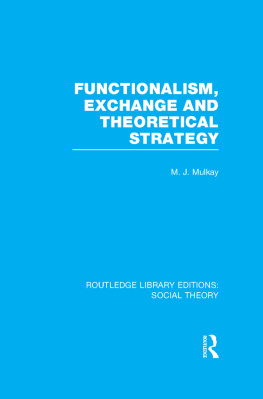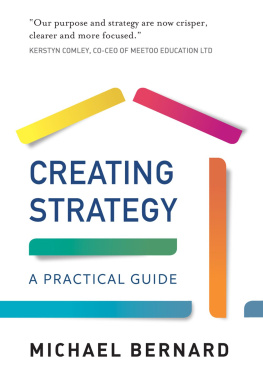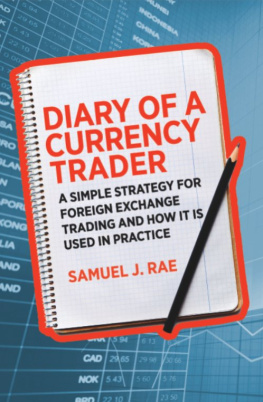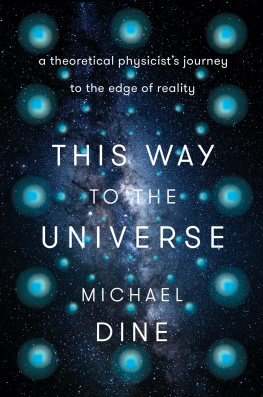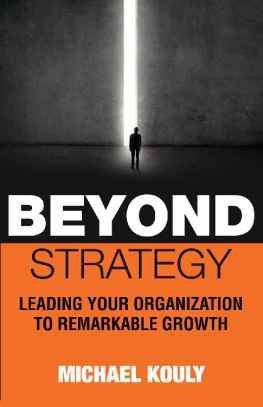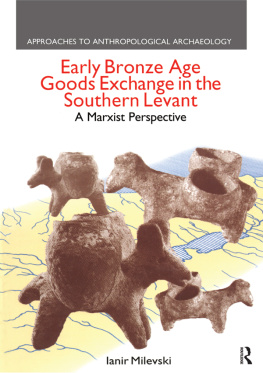ROUTLEDGE LIBRARY EDITIONS:
SOCIAL THEORY
Volume 26
FUNCTIONALISM, EXCHANGE AND
THEORETICAL STRATEGY
FUNCTIONALISM, EXCHANGE AND
THEORETICAL STRATEGY
M. J. MULKAY
First published in 1971
This edition first published in 2015
by Routledge
2 Park Square, Milton Park, Abingdon, Oxon, OX14 4RN
and by Routledge
711 Third Avenue, New York, NY 10017
Routledge is an imprint of the Taylor & Francis Group, an informa business
1971 M. J. Mulkay
All rights reserved No part of this book may be reprinted or reproduced or utilised in any form or by any electronic, mechanical, or other means, now known or hereafter invented, including photocopying and recording, or in any information storage or retrieval system, without permission in writing from the publishers.
Trademark notice: Product or corporate names may be trademarks or registered trademarks, and are used only for identification and explanation without intent to infringe.
British Library Cataloguing in Publication Data
A catalogue record for this book is available from the British Library
ISBN: 978-0-415-72731-0 (Set)
eISBN: 978-1-315-76997-4 (Set)
ISBN: 978-1-138-78246-4 (Volume 26)
eISBN: 978-1-315-76362-0 (Volume 26)
Publishers Note
The publisher has gone to great lengths to ensure the quality of this reprint but points out that some imperfections in the original copies may be apparent.
Disclaimer
The publisher has made every effort to trace copyright holders and would welcome correspondence from those they have been unable to trace.
Functionalism, exchange and
theoretical strategy
M. J. Mulkay
London Routledge & Kegan Paul
First published 1971
by Routledge and Kegan Paul Ltd.
Broadway House
68-74 Carter Lane
London, EC4V 5EL
Printed in Great Britain by
Ebenezer Baylis & Son Limited
The Trinity Press, Worcester, and London
M. J. Mulkay, 1971
No part of this book may be reproduced in
any form without the permission from the
publisher, except for the quotation of
brief passages in criticism
ISBN 0 7100 6980 4
For Lucy, Anna and Lisa
Contents
The approach adopted in this book to the presentation of sociological theory was devised in a series of lectures given at Simon Fraser University, British Columbia, and developed further at the University of Aberdeen. Versions of the work have been read by Gordon Horobin and Tony Giddens, whom I wish to thank. Thanks are also due to Pat Rennie, who was a great help.
This is a study of the development of certain sociological ideas. More specifically, it is an attempt to describe the recent growth of functional and exchange theory by interpreting the work of five important theorists, in chronological order, and by examining some of the intellectual connections between their theories. The study is undertaken from a definite perspective which both controls and limits the exposition of the theories and the account offered of their interrelations. For the sake of clarity, this perspective must be described briefly at the outset.
In the chapters to come a distinction is made between theoretical goal, theoretical strategy and theoretical content. By theoretical goal is meant the long-term objective toward which a theorist is striving. The term theoretical strategy refers to the general policies which a theorist adopts as a means of ensuring that his work makes a valuable contribution to his long-run theoretical goal. The substantive conceptions and propositions which are put forward to depict social phenomena, in accordance with a particular strategy and in pursuit of a long-term objective, constitute the content of a theory.
The theorists discussed here share a common goal. They all want to contribute to the construction of a comprehensive and scientific theory of social life. Their strategies, however, differ considerably. For example, where one theorist decides that a general sociological theory can be formulated only after extensive conceptual elaboration at a most abstract level, another approaches the problem by keeping his conceptual apparatus to a minimum, by reducing the level of abstraction, and by concentrating on explanation rather than conceptualization. Such divergent strategies, when implemented with reasonable consistency, produce theoretical schemes with quite different content. This tendency for theoretical content to be moulded by theoretical strategy provides the focus of the present study. Consequently, each theoretical opus is presented in three stages. First, the theorists long-term goal is specified, along with his theoretical strategy and the resultant short-run objectives. Secondly, the theoretical content is expounded as an attempt to contribute to the theoretical goal by means of the given strategy. Thirdly, the strengths and weaknesses of each body of theory and its associated strategy are assessed in relation to the ultimate theoretical objective.
It may be objected that this method of presentation oversimplifies the relationship between content and strategy in the development of theoretical schemes. For theoretical strategies are seldom worked out fully, in advance of all substantive notions. We must accept, therefore, that in many cases there is a reciprocal interplay between strategy and substantive theory. Nevertheless, we are justified in beginning the exposition of each theoretical scheme with an account of its accompanying strategy for several reasons: first, because all but the last of the theorists discussed below made an early strategical statement which guided their later work; secondly, because, whether or not strategy preceded content in time, many aspects of their work can best be understood as attempts to apply logically prior strategical decisions; and, thirdly, because many of the deficiencies of their schemes are due to the character of their theoretical strategies.
Theoretical strategies are regarded as important here, partly because they shape theoretical content and partly because they are a source of theoretical defects. A second, and related, reason for emphasizing theoretical strategy is that the five schemes to be studied are historically linked together through their strategies. Each theorist to be examined below is connected with prior theory and particularly with the work of his immediate predecessor, in a negative as well as a positive fashion. On the one hand, each theorist inevitably retains many of the substantive notions of previous theory. This is the positive link. On the other hand, each theorist uses these notions differently, owing to his choice of a strategy designed to avoid the faults of prior theory. This is the negative link. Because the method of exposition adopted here stresses the strategical component of each theory, more attention will be paid to the strategical differences between theories than to the more obvious substantive resemblances. Thus the guiding theme of subsequent chapters will be that, despite broad agreement about theoretical goals and despite considerable continuity in theoretical content, each theorist is forced to devise a new strategy as a directresponse to the demonstrably unsuccessful strategies of his predecessors.
In this essay the recent growth of functionalism and exchange theory in sociology is viewed as a dialectical process. Theoretical development is regarded as being neither continuous nor, in any direct way, cumulative. Instead, it is seen as arising from a number of discrete and intermittent theoretical reorganizations, which centre upon new strategies devised as replacements for the unsuccessful policies adopted by prior theory. The main concern here is with the emergence of exchange theory as a reaction against the strategy and, consequently, much of the content of functionalism. At the same time, however, an attempt is made to show how a similar dialectical process is evident in the genesis of structural-functionalism itself and also how the dialectic operates within each school of thought.


